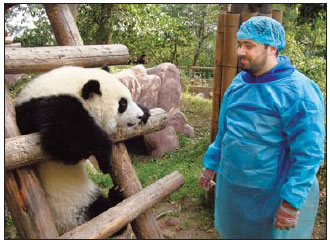Care bears
 |
|
Sweden's Ali Shakorian has a close encounter with a giant panda. |
One of the pambassadors, Huang Xi, said this project was a good beginning.
"Most people just work hard and care about their jobs. They forget about animals and the environment," said Huang, who makes handicrafts in the factory town of Guangzhou, Guangdong province.
No one knows exactly how many giant pandas remain in the wild, but researchers at the base and statistics by the State Forestry Administration estimate the number at 1,600 worldwide, down from 2,500 in the 1970s. They inhabit mountainous regions in the three neighboring provinces of Sichuan (1,200 pandas), Shaanxi (300) and Gansu (100).
A logging ban in 1998 helped stop the alarming decline in their numbers, but large-scale infrastructure construction and a devastating earthquake in May 2008 have damaged much of their food source and migration routes.
According to WWF, the 8.0-magnitude earthquake that claimed over 87,000 lives, affected 83 percent of the giant pandas' habitat in the region - dubbed "the green heart of China".
It also badly damaged the Longxi Hongkou nature reserve, where the pambassadors spent five days, and destroyed protection systems above 2,000 meters that took 30 years to put in place. Twenty-seven of Sichuan's 40-something giant panda nature reserves were hit.
The majority of the wild pandas live in Sichuan, which sits on one of the world's 25 biodiversity hot spots, the Minshan and Qionglai mountains, home to numerous endangered species, such as the golden monkey, leopard cat, takin and red panda.
 |
|
Frenchman David Algranti is cautious about getting close to a panda because getting a playful bite is a constant peril. |
The base has embarked on an ambitious new project called "Happy Valley" that aims to introduce pandas born in captivity into the wild, a feat that has never been successfully carried out before.
The under-construction project, about a two-hour drive from the Chengdu base, will feature three zones that effectively act as buffers between man and the wild, with the pandas rotating between them and acclimatizing to reduced human contact.
Zhang said it will be completed in 2015, and the first pandas relocated there the following year, with a goal of setting them free within 10-20 years.
"We have to be very, very careful," he said. "Many others have tried this and failed."
Robertson, who was privy to a night tour of the facility on Nov 3 that involved access to the infant-panda rearing area, said nothing surprises her anymore about China's wild ambitions.
"I didn't know they had this plan before I came, but now I feel convinced it can succeed, even though it needs a lot of research."
The Chengdu Research Base of Giant Panda Breeding has grown from 10 hectares and six pandas 20 years ago, to 70 hectares and over 100 pandas now.
For the last several years, it has welcomed about half a million tourists a year.
Tour guides at the base say that more than half of the visitors are non-Chinese, many of whom are willing to fork out 1,000 yuan ($150) to be photographed holding a giant panda cub on a wooden bench for one minute.
If Robertson keeps doing her job, hopefully the animals will be around for a lot longer than that.
 0
0 







Go to Forum >>0 Comments